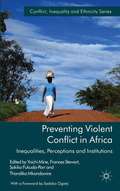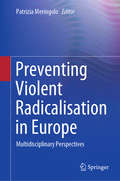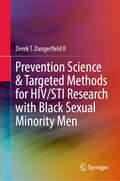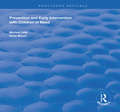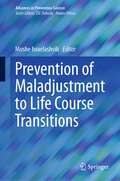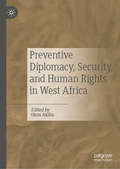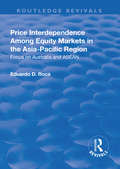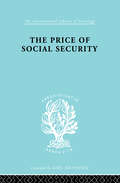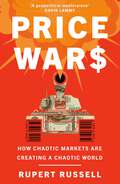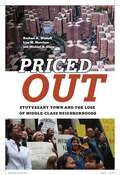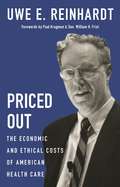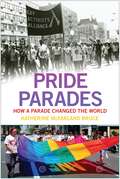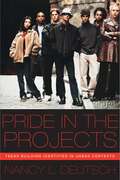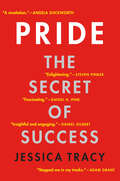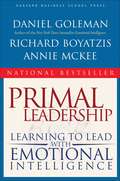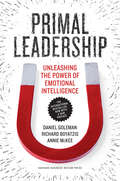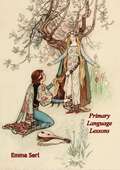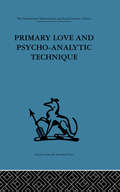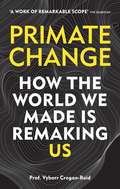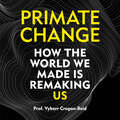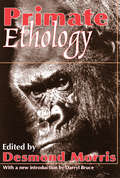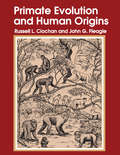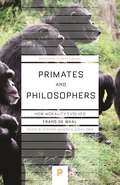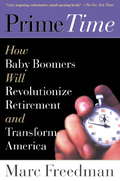- Table View
- List View
Preventing Violent Conflict in Africa
by Yoichi MineHorizontal inequalities are root causes of violent conflict in Africa. Yet, people take actions not because of statistical data on inequalities, of which they might not be aware, but because of injustices they perceive. This volume analyses the results of original surveys with over 3,000 respondents in African cities and towns, exposing clear discrepancies between objective inequalities and people's subjective perceptions. The contributors examine experiences in country pairs and probe into the reasons why neighbouring countries, sharing common historical traits, sometimes took contrasting pathways of peace and violent conflict. Combining quantitative analysis and qualitative anatomy of historical experiences of conflict and reconciliation in Rwanda, Burundi, Ghana, C#65533;te d'Ivoire, South Africa, Zimbabwe, Uganda, Tanzania, Kenya and Nigeria, the study brings forward a set of policy recommendations for development practitioners. This work further addresses the issue of institutional choice and reveals how sustainable power-sharing and decentralisation contribute to political stability in Africa.
Preventing Violent Radicalisation in Europe: Multidisciplinary Perspectives
by Patrizia MeringoloThis book brings together the latest literature and European experiences on preventing youth violent radicalisation and violent actions in intergroup relations. Youth violent radicalisation is a significant problem within the European context, and requires an exploration of how various social actors can play an active role in preventing radicalisation in minors and young adults. This complex issue needs to be explored through a multidisciplinary approach, and effective operational models are needed in order to tackle it. This book describes the theoretical framework for such an approach in all its facets. The book’s originality lies in its psychosocial and participatory approach, aimed at improving results through professional training and community empowerment for building trusting relationships and educational activities. It also proposes “alternative narratives”, which are a way of representing people and groups within a social context, thereby overcoming stereotyped visions and stigma. This book focuses on participation and communication among stakeholders, social inclusion, strengthening democratic values, and pursuing a proactive instead of a reactive approach to preventing radicalisation. Highly topical, the book will appeal to researchers and students of the social and behavioural sciences interested in youth radicalisation, including social work and social policy, as well as practitioners working within the juvenile justice system.
Prevention Science & Targeted Methods for HIV/STI Research with Black Sexual Minority Men
by Derek T. Dangerfield IIDespite substantial advances in HIV/STI treatment and prevention for general population health, sexual health disparities persist for Black gay, bisexual, and other Black sexual minority men (SMM). Strategies to build trust and overcome barriers are not well-established and solutions remain elusive. The contemporary prevention science landscape also requires updated perspectives in light of changing social policies, technological advancements, and prevention options. This book is the first to provide a comprehensive overview for sexual health prevention science using years of significant research from Dangerfield II et al. involving U.S. Black SMM in light of existing studies. This book identifies knowledge and practice gaps and proposes recommendations for innovative methods for academic collaboration with communities of practice. Researchers, clinicians, and public health practitioners will be guided through the sexual health research and intervention process using targeted contemporary studies to enhance their practice. This book serves as a valuable resource for enhancing the skills of emerging prevention scientists and clinicians. It also offers innovative strategies for experienced prevention experts to refine techniques and address persistent health disparities in sexual health outcomes. The book targets audiences across disciplines, including public health, sociology, psychology, nursing, medicine, anthropology, and population science and can be applied to marginalized communities globally. By bridging research, practice, and innovation, this book serves as a transformative resource for addressing sexual health disparities and empowering collaborative solutions to advance equity in the U.S. and around the globe.
Prevention and Early Intervention with Children in Need (Routledge Revivals)
by Michael Little Kevin MountFirst published in 1999, this volume examines how, in the middle of the nineteenth century, Dr John Snow is reputed to have wrenched the handle from a street pump in central London, forcing people in the neighbourhood to change their drinking habits and so preventing them from contracting cholera from the dirty water. Aspects of the story may be apocryphal, but the general drift of Snow's assault on disease has enormous appeal for health, education, social services and police professionals working with children in need. Why spend so much time struggling to find strategies to cope with the more intractable problems among adolescents, when the problems might be prevented from occurring in the first place? This book tries to untangle some of the complex ideas that underpin effective prevention and early intervention activity on behalf of children experiencing social or psychological difficulty. It describes twenty programmes from Europe and America that have made an impact and where there has been an attempt to evaluate their usefulness. On this basis it suggests some principles for more effective preventive practice.
Prevention of Maladjustment to Life Course Transitions (Advances in Prevention Science)
by Moshe IsraelashviliThis book provides a comprehensive and updated review of the concepts, models, and interventions related to the process of adjustment to life course transitions. In times of transition, an individual is exposed to experiences that require them to assume new roles and exhibit updated behaviors. Regardless of the characteristics of these transitions, exposure to normative trajectories imposes on the person an intensive engagement in a process of (re-)adjustment. Sometimes this demand is beyond the scope of one's ability, motivation, or comprehension. Hence, some people might ineffectively perceive and/or react to the change and end up feeling unable to handle the change and inclined to escape the situation. A preventive intervention that either reduces the impact of possible risk factors or fosters possible protective factors would support the people in managing the transition. While the importance of prevention of maladjustment is repeatedly mentioned in the literature, this is the first-known book on how to prevent maladjustment. It examines how the sense of transition emerges, what adjustment means, the models that elaborate on how people manage in times of transition, what the antecedents of maladjustment are, and especially how maladjustment could be prevented. Out of these discussions, a new model, The Transitional Stress and Adjustment (TSA) Model, is suggested as a grand framework for paving a way forward to better prevent people's maladjustment to life course transitions. Prevention of Maladjustment to Life Course Transitions is a much-needed cornerstone in the future development within the prevention science framework. This book has interdisciplinary appeal for researchers, practitioners, and graduate students in psychology, sociology, public health, social work, criminology, medicine, health sciences, public policy, economics, and education who consider prevention an important vehicle of intervention to promote health and wellbeing. Its focus on the topic of adjustment also would be of special interest to those who explore child and youth development.
Preventive Diplomacy, Security, and Human Rights in West Africa
by Okon AkibaThis edited volume focuses on the development and conflict prevention mechanism of the Economic Community of West African States, ECOWAS. The contributors discuss complex socio-political and economic issues and use a cross disciplinary approach to treat most of the dominant research questions in the field. The chapters come nicely together in a kaleidoscope of knowledge deriving from scholarly investigative traditions in political science, anthropology, economics, law, and sociology. The book is conceived as a source of reference and for graduate courses in African politics, development, human rights, transnational law, and international public policy.
Price Interdependence Among Equity Markets in the Asia-Pacific Region: Focus on Australia and ASEAN
by Eduardo RocaThis title was first published in 2000: An investigation of the issue of financial markets interdependence or integration through the application of recently developed and powerful techniques in time series econometrics. The text provides coverage of theoretical analysis and applications in the context of the Asia-Pacific region.
Price Socl Security Ils 187 (International Library of Sociology)
by G. WilliamsFirst Published in 1998. Routledge is an imprint of Taylor & Francis, an informa company.
Price Wars: How Chaotic Markets Are Creating a Chaotic World
by Rupert RussellFor Rupert Russell, the shock of the Trump-Brexit victories was only the latest in a decade full of them: the unstoppable war in Syria, huge migrant flows into Europe, beheadings in Iraq, children caged at the US border. In Price Wars he sets out on an improbable journey to investigate what caused the wave of chaos that consumed the world in the 2010s.Armed with a notebook, flak jacket and pink socks, Russell travels to modern apocalypses across five continents, embedding with separatist soldiers in the trenches of Eastern Ukraine, gangs of street kids battling over garbage in Caracas, the UN bomb disposal squad in Iraq and cattle raiders in Northern Kenya. He traces the origins of these conflicts back to dramatic and mysterious swings in the prices of essential commodities. He meets with commodity speculators who describe the inner workings of these volatile markets, explaining how food prices can spike even in years of abundant harvests, causing bread riots and revolutions. Oil prices can surge on rumours, enriching and emboldening dictators and terrorists alike. These price shocks, and many others across the decade, triggered local disasters that became global catastrophes. It is chaotic prices, Russell learned, fuelled by banks and hedge funds in New York and London, that have toppled regimes and fractured the West.Price Wars is a page-turning chronicle of discovery and a ground-breaking expose of the power of price to devastate the world.
Priced Out: Stuyvesant Town and the Loss of Middle-Class Neighborhoods
by Lisa M. Morrison Michael R. Glass Rachael A. WoldoffOn an average morning in the tree-lined parks, plazas, and play-areas of Manhattan’s Stuyvesant Town housing development, birds chirp as early risers dash off to work, elderly residents enjoy a peaceful morning stroll, and flocks of parents usher their children to school. It seems an unlikely location for conflict and strife, yet this eighteen-block area, initially planned as middle-class affordable housing, is the site of an ongoing struggle between long-term, rent-regulated residents, younger, market-rate tenants, and new owners seeking to turn this community into a luxury commodity. Priced Out takes readers into this heated battle as a transitioning neighborhood wrestles with contemporary capitalist strategies and the struggle to preserve renters’ rights. Since the early 2000’s, Stuyvesant Town’s owners have sought to transform this iconic Manhattan housing development into a luxury destination for those able to afford the higher price tag. Attempting to replace longtime residents with younger, more affluent tenants, they have disrupted native residents’ sense of place, community, and their perceived quality of life. Through resident interviews, the authors offer an intimate view into the lives of different groups of tenants involved in this struggle for prime real estate in New York, from students experiencing the city for the first time to baby boomers hanging on to the vestiges of middle-class urban life. A compelling, fascinating account of changing urban landscapes and the struggle for security, Priced Out offers a comprehensive perspective of a community that, to some, is becoming unrecognizable as it is upgraded and altered.
Priced Out: The Economic and Ethical Costs of American Health Care
by Uwe E. ReinhardtFrom a giant of health care policy, an engaging and enlightening account of why American health care is so expensive—and why it doesn't have to beUwe Reinhardt was a towering figure and moral conscience of health care policy in the United States and beyond. Famously bipartisan, he advised presidents and Congress on health reform and originated central features of the Affordable Care Act. In Priced Out, Reinhardt offers an engaging and enlightening account of today's U.S. health care system, explaining why it costs so much more and delivers so much less than the systems of every other advanced country, why this situation is morally indefensible, and how we might improve it.The problem, Reinhardt says, is not one of economics but of social ethics. There is no American political consensus on a fundamental question other countries settled long ago: to what extent should we be our brothers' and sisters' keepers when it comes to health care? Drawing on the best evidence, he guides readers through the chaotic, secretive, and inefficient way America finances health care, and he offers a penetrating ethical analysis of recent reform proposals. At this point, he argues, the United States appears to have three stark choices: the government can make the rich help pay for the health care of the poor, ration care by income, or control costs. Reinhardt proposes an alternative path: that by age 26 all Americans must choose either to join an insurance arrangement with community-rated premiums, or take a chance on being uninsured or relying on a health insurance market that charges premiums based on health status.An incisive look at the American health care system, Priced Out dispels the confusion, ignorance, myths, and misinformation that hinder effective reform.
Pride Parades: How a Parade Changed the World
by Katherine McFarland BruceOn June 28, 1970, two thousand gay and lesbian activists in New York, Los Angeles, and Chicago paraded down the streets of their cities in a new kind of social protest, one marked by celebration, fun, and unashamed declaration of a stigmatized identity. Forty-five years later, over six million people annually participate in 115 Pride parades across the United States. They march with church congregations and college gay-straight alliance groups, perform dance routines and marching band numbers, and gather with friends to cheer from the sidelines. With vivid imagery, and showcasing the voices of these participants, Pride Parades tells the story of Pride from its beginning in 1970 to 2010. Though often dismissed as frivolous spectacles, the author builds a convincing case for the importance of Pride parades as cultural protests at the heart of lesbian, gay, bisexual, and transgender (LGBT) community. Weaving together interviews, archival reports, quantitative data, and ethnographic observations at six diverse contemporary parades in New York City, Salt Lake City, San Diego, Burlington, Fargo, and Atlanta, Bruce describes how Pride parades are a venue for participants to challenge the everyday cultural stigma of being queer in America, all with a flair and sense of fun absent from typical protests. Unlike these political protests that aim to change government laws and policies, Pride parades are coordinated, concerted attempts to improve the standing of LGBT people in American culture.
Pride in the Projects: Teens Building Identities in Urban Contexts (Qualitative Studies in Psychology #5)
by Nancy L. DeutschTeens in America’s inner cities grow up and construct identities amidst a landscape of relationships and violence, support and discrimination, games and gangs. In such contexts, local environments such as after-school programs may help youth to mediate between social stereotypes and daily experience, or provide space for them to consider themselves as contributing members of a community.Based on four years of field work with both the adolescent members and staff of an inner-city youth organization in a large Midwestern city, Pride in the Projects examines the construction of identity as it occurs within this local context, emphasizing the relationships within which identities are formed. Drawing on research in psychology, sociology, education, and race and gender studies, the volume highlights the inadequacies in current identity development theories, expanding our understanding of the lives of urban teens and the ways in which interpersonal connections serve as powerful contexts for self-construction. The adolescents’ stories illuminate how they find ways to discover who they are, and who they would like to be — in positive and healthy ways — in the face of very real obstacles. The book closes with implications for practice, alerting scholars, educators, practitioners, and concerned citizens of the positive developmental possibilities inherent in youth settings when we pay attention to the voices of youth.
Pride: The Secret of Success
by Jessica Tracy“Jessica Tracy has flipped the script on pride, showing that it’s not just a deadly sin to be avoided, but also a vitalizing virtue to be nurtured.” —Robert Cialdini, New York Times–bestselling author of InfluenceWhy did Paul Gauguin abandon middle-class life to follow the path of a starving artist? What explains the massive success of Steve Jobs, a man with great ideas but weak programming skills and a questionable managerial style? How did Dean Karnazes—the famed “Ultramarathon Man”—transform himself from a directionless desk jockey into an extreme athlete who once ran fifty marathons in fifty days? As the renowned emotion researcher Jessica Tracy reveals, each of these superachievers has been motivated by an often maligned emotion: pride. Its dark, hubristic side is well known, but Tracy shows that pride is also essential for helping us become our best, brightest selves. It makes us strive for excellence. In the right doses and the right contexts, it has been proven to boost creativity, motivate altruism, and confer power and prestige on those who display it. In Pride, Tracy explains how we can make this double-edged emotion serve us—rather than the other way around.Previously published in hardcover as Take Pride“A revelation. A renowned psychologist, Jessica Tracy explains that seeking our best self is nothing to be ashamed of, but that seeking praise at all costs gets us into the worst kind of trouble” —Angela Duckworth, #1 New York Times–bestselling author of Grit“Fascinating . . . Tracy uses original research to show that pride is a major part of what it means to be human and can be harnessed as a force for good.” —Daniel H. Pink, New York Times–bestselling author of Drive
Primal Leadership, With a New Preface by the Authors
by Daniel Goleman Annie Mckee Richard BoyatzisThis is the book that established "emotional intelligence" in the business lexicon-and made it a necessary skill for leaders.Managers and professionals across the globe have embraced Primal Leadership, affirming the importance of emotionally intelligent leadership. Its influence has also reached well beyond the business world: the book and its ideas are now used routinely in universities, business and medical schools, and professional training programs, and by a growing legion of professional coaches.This refreshed edition, with a new preface by the authors, vividly illustrates the power-and the necessity-of leadership that is self-aware, empathic, motivating, and collaborative in a world that is ever more economically volatile and technologically complex. It is even timelier now than when it was originally published.From bestselling authors Daniel Goleman, Richard Boyatzis, and Annie McKee, this groundbreaking book remains a must-read for anyone who leads or aspires to lead.Also available in ebook format wherever ebooks are sold.
Primary Language Lessons
by Emma SerlAlong with Charlotte Mason, Serl's work is considered one of the more lasting classics on Home Schooling. "Primary Language Lessons" deals with word usage, punctuation, capitalization, abbreviations, contractions, letter writing, memorization and recitation of poetry, retelling or rewriting of brief narratives, copy-work, and dictation. Overall emphasis is upon proper word usage in both spoken and written communication. Beautiful artwork reproductions (in black and white) are used as the basis for a number of lessons as are myths, legends, fables, fairy tales, historical vignettes, biographies, Bible stories, and nature lessons. This work is intended for second and third graders.-Print ed.
Primary Love and Psycho-Analytic Technique (International Behavioural And Social Sciences Ser. #Vol. 88)
by Michael BalintTavistock Press was established as a co-operative venture between the Tavistock Institute and Routledge & Kegan Paul (RKP) in the 1950s to produce a series of major contributions across the social sciences. This volume is part of a 2001 reissue of a selection of those important works which have since gone out of print, or are difficult to locate. Published by Routledge, 112 volumes in total are being brought together under the name The International Behavioural and Social Sciences Library: Classics from the Tavistock Press. Reproduced here in facsimile, this volume was originally published in 1965 and is available individually. The collection is also available in a number of themed mini-sets of between 5 and 13 volumes, or as a complete collection.
Primate Change: How the world we made is remaking us
by Vybarr Cregan-Reid'A work of remarkable scope' - GuardianFT Best science books of 2018Primate Change has been adapted into a radio series for the BBC WORLD SERVICE.*This is the road from climate change to primate change.PRIMATE CHANGE is a wide-ranging, polemical look at how and why the human body has changed since humankind first got up on two feet. Spanning the entirety of human history - from primate to transhuman - Vybarr Cregan-Reid's book investigates where we came from, who we are today and how modern technology will change us beyond recognition.In the last two hundred years, humans have made such a tremendous impact on the world that our geological epoch is about to be declared the 'Anthropocene', or the Age of Man. But while we have been busy changing the shape of the world we inhabit, the ways of living that we have been building have, as if under the cover of darkness, been transforming our bodies and altering the expression of our DNA, too.Primate Change beautifully unscrambles the complex architecture of our modern human bodies, built over millions of years and only starting to give up on us now.'Our bodies are in a shock. Modern living is as bracing to the human body as jumping through a hole in the ice. Our bodies do not know what century they were born into and they are defending and deforming themselves in response.'
Primate Change: How the world we made is remaking us
by Vybarr Cregan-ReidIF YOU THINK YOU ARE YOU, THINK AGAIN.PRIMATE CHANGE is a wide-ranging, polemical look at how and why the human body has changed since humankind first got up on two feet. Spanning the entirety of human history - from primate to transhuman - Vybarr Cregan-Reid's book investigates where we came from, who we are today and how modern technology will change us beyond recognition.In the last two hundred years, humans have made such a tremendous impact on the world that our geological epoch is about to be declared the 'Anthropocene', or the Age of Man. But while we have been busy changing the shape of the world we inhabit, the ways of living that we have been building have, as if under the cover of darkness, been transforming our bodies and altering the expression of our DNA, too.PRIMATE CHANGE beautifully unscrambles the complex architecture of our modern human bodies, built over millions of years and only starting to give up on us now.'Our bodies are in a shock. Modern living is as bracing to the human body as jumping through a hole in the ice. Our bodies do not know what century they were born into and they are defending and deforming themselves in response'
Primate Change: How the world we made is remaking us
by Vybarr Cregan-ReidIF YOU THINK YOU ARE YOU, THINK AGAIN.PRIMATE CHANGE is a wide-ranging, polemical look at how and why the human body has changed since humankind first got up on two feet. Spanning the entirety of human history - from primate to transhuman - Vybarr Cregan-Reid's book investigates where we came from, who we are today and how modern technology will change us beyond recognition.In the last two hundred years, humans have made such a tremendous impact on the world that our geological epoch is about to be declared the 'Anthropocene', or the Age of Man. But while we have been busy changing the shape of the world we inhabit, the ways of living that we have been building have, as if under the cover of darkness, been transforming our bodies and altering the expression of our DNA, too.PRIMATE CHANGE beautifully unscrambles the complex architecture of our modern human bodies, built over millions of years and only starting to give up on us now.'Our bodies are in a shock. Modern living is as bracing to the human body as jumping through a hole in the ice. Our bodies do not know what century they were born into and they are defending and deforming themselves in response'(p) 2018 Octopus Publishing Group
Primate Ethology
by Pendleton HerringThis is a groundbreaking workwhich brought together studiesof monkeys and apes from boththe laboratory and the field. Manybroad aspects of primate life,including facial expressions,sexual signals, grooming, play,social organization and parental care, are covered bythe contributors and provided a whole new approach toprimate behavior.
Primate Evolution and Human Origins
by Russell L. CiochonPrimate Evolution and Human Origins compiles, for the first time, the major ideas and publications that have shaped our current view of the evolutionary biology of the primates and the origin of the human line. Designed for freshmen-to-graduate students in anthropology, paleontology, and biology, the book is a unique collection of classic papers, culled from the past 20 years of research. It is also an important reference for academicians and researchers, as it covers the entire scope of primate and human evolution (with an emphasis on the fossil record). A comprehensive bibliography cites over 2000 significant articles not found in the main text.
Primates and Philosophers: How Morality Evolved (Princeton Science Library #43)
by Frans de WaalCan virtuous behavior be explained by nature, and not by human rational choice? "It's the animal in us," we often hear when we've been bad. But why not when we're good? Primates and Philosophers tackles this question by exploring the biological foundations of one of humanity's most valued traits: morality. In this provocative book, renowned primatologist Frans de Waal argues that modern-day evolutionary biology takes far too dim a view of the natural world, emphasizing our "selfish" genes and reinforcing our habit of labeling ethical behavior as humane and the less civilized as animalistic. Seeking the origin of human morality not in evolution but in human culture, science insists that we are moral by choice, not by nature. Citing remarkable evidence based on his extensive research of primate behavior, de Waal attacks "Veneer Theory," which posits morality as a thin overlay on an otherwise nasty nature. He explains how we evolved from a long line of animals that care for the weak and build cooperation with reciprocal transactions. Drawing on Darwin, recent scientific advances, and his extensive research of primate behavior, de Waal demonstrates a strong continuity between human and animal behavior. He probes issues such as anthropomorphism and human responsibilities toward animals. His compelling account of how human morality evolved out of mammalian society will fascinate anyone who has ever wondered about the origins and reach of human goodness. Based on the Tanner Lectures de Waal delivered at Princeton University's Center for Human Values in 2004, Primates and Philosophers includes responses by the philosophers Peter Singer, Christine M. Korsgaard, and Philip Kitcher and the science writer Robert Wright. They press de Waal to clarify the differences between humans and other animals, yielding a lively debate that will fascinate all those who wonder about the origins and reach of human goodness.
Prime Time: How Baby Boomers Will Revolutionize Retirement And Transform America
by Marc FreedmanOver the next three decades, the number of Americans over fifty will double, swelling to more than a quarter of the population. Already we are living thirty years longer than a century ago, with further gains expected in the coming years. The end result is a new stage of life, one as long or longer than childhood or middle age in duration, and one spent in unprecedented good health. Yet, as individuals, and as a society, we've shown little imagination or wisdom in using this great gift of a third age. Marc Freedman identifies the new longevity as not a problem to be solved, but an opportunity to be seized-provided we can engage the experience, talent, and idealism of older Americans. At a juncture when the middle-generation faces a time-famine, struggling to simultaneously raise kids and work long hours on the job, the older generation is awash in free time, poised to succeed women as the trustees of civic life in this country. In the process they stand to find new meaning and purpose in their lives, and abandon the limbo-like state unfulfilling for so many older individuals. Freedman argues that the aging phenomenon, the massive transformation that many portray as our downfall, may in fact be our best hope for renewal as a nation.
